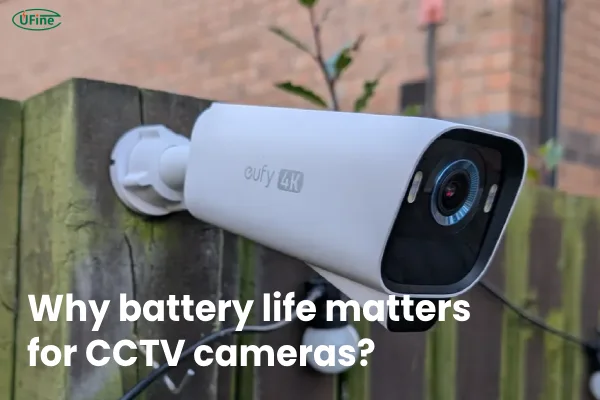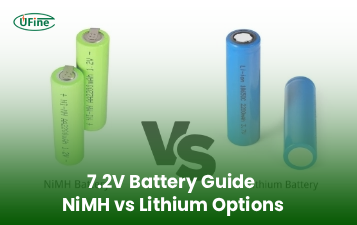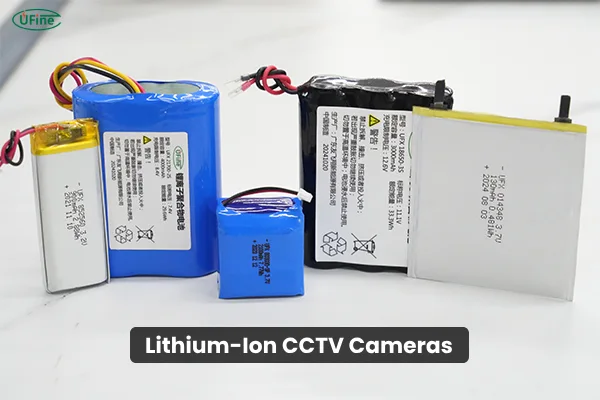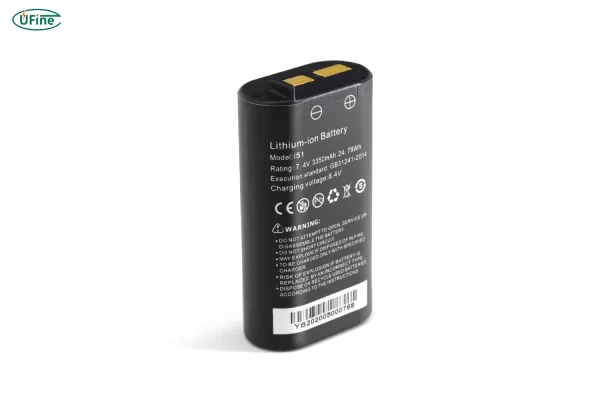
- Part 1. Why battery life matters for CCTV cameras
- Part 2. Built-in vs. external battery packs
- Part 3. Chemical types of batteries used in CCTV cameras
- Part 4. Key battery terms you should know
- Part 5. How long can a CCTV camera battery last?
- Part 6. What influences CCTV camera battery lifespan?
- Part 7. How to extend CCTV camera battery life
- Part 8. Signs you need to replace your CCTV battery
- Part 9. Looking for custom CCTV camera battery solutions?
- Part 10. FAQs
Part 1. Why battery life matters for CCTV cameras
Battery life is a critical factor in the performance of modern CCTV cameras. Whether you’re using them for home security, office surveillance, or remote industrial monitoring, uninterrupted power is essential. In many cases, CCTV cameras are installed in places without direct access to wired electricity. That’s where the CCTV camera battery becomes a lifeline.

A long-lasting battery ensures the camera continues to record during power outages, nighttime surveillance, or when movement is detected. More importantly, it protects property and people. In high-risk environments, a few minutes of lost footage can mean missed evidence or an undetected threat. Therefore, knowing how long a CCTV battery lasts—and how to choose the right one—is vital.
Part 2. Built-in vs. external battery packs
When it comes to powering CCTV cameras, there are two general battery configurations: built-in batteries and external battery packs.
- Built-in Batteries: These are internal, compact batteries that come pre-installed in wireless CCTV cameras. While they make the camera easier to install and operate, their small size usually limits runtime to a few days at most—ideal for temporary monitoring or low-activity areas.
- External Battery Packs: These are separate from the camera, often larger in size, and can be connected via cable. Because they have higher capacity, they can power a CCTV system for several days or even weeks. They’re especially useful in 24/7 setups, remote areas, and off-grid applications.
While built-in options are more convenient, external battery packs offer more flexibility and extended uptime. For high-demand or long-term use, external battery packs paired with high-capacity lithium batteries are usually the better choice.
Part 3. Chemical types of batteries used in CCTV cameras
The battery chemistry greatly impacts its performance, safety, and life expectancy. Let’s break down the most common types used in CCTV camera batteries:
- Lithium-ion (Li-ion): These are the most widely used rechargeable batteries today. They offer high energy density, fast charging, and low weight. Great for built-in or portable CCTV setups.
- LiFePO₄ (Lithium Iron Phosphate): These batteries are more stable, safer, and longer-lasting than Li-ion. They also handle extreme temperatures better. That makes them ideal for solar-powered CCTV systems and industrial environments.
- Lead-acid: Heavier and bulkier. These are used in large backup systems where space is not a concern. However, their shorter cycle life and low energy density make them less desirable for modern CCTV.
- NiMH and Alkaline: Mostly found in basic or older systems. These batteries don’t last long and are not ideal for continuous or high-resolution surveillance.
NiMH vs. Li-ion: 15 Essential Facts Compared
Among these, lithium-based batteries—especially LiFePO₄—are the most recommended due to their performance and reliability.
Part 4. Key battery terms you should know
Before choosing a CCTV camera battery, it’s important to understand some technical terms. These specifications directly influence how long your camera can run:
- mAh (milliampere-hour): Indicates battery capacity. A higher mAh means a longer run time.
- Voltage (V): CCTV cameras commonly operate at 5V, 12V, or 24V. Voltage must match the camera’s input requirement.
- Wh (watt-hour): This tells you how much energy a battery provides. Calculated as mAh × Voltage ÷ 1000.
- Cycle Life: Refers to how many full charge/discharge cycles the battery can go through before its capacity drops significantly.
For example, a 12V 10,000mAh battery offers 120Wh of energy, enough to run a 5W CCTV camera for 24 hours non-stop.
Part 5. How long can a CCTV camera battery last?
The most frequently asked question is, “How long can a CCTV camera battery last?” The answer depends on multiple factors, but here are some general estimates:
- Built-in lithium battery: Typically lasts 1–3 days depending on usage and resolution.
- External lithium battery pack (12V 20Ah): Can last 5–10 days on a full charge.
- LiFePO₄ battery + solar panel system: Can provide months of continuous surveillance when optimized.
If the camera is motion-triggered instead of recording continuously, battery life can extend dramatically. But if the camera uses high-resolution video, infrared night vision, or pan-tilt-zoom (PTZ) motors, expect faster battery drain.
Part 6. What influences CCTV camera battery lifespan?
Battery lifespan is not just about capacity. Many variables affect how long a CCTV camera battery lasts:
- Recording Mode: Continuous recording drains more power than motion-activated mode.
- Video Resolution and FPS: The higher the image quality and frame rate, the more energy is needed.
- Temperature: Cold weather slows chemical reactions and reduces capacity. Excessive heat can damage battery life.
- Wireless Connectivity: Cameras using Wi-Fi or 4G to upload footage consume more energy.
- Battery Age: Over time, all batteries degrade. A 2-year-old battery may hold 60–70% of its original charge.
Regular maintenance, weatherproofing, and choosing the right battery chemistry can help reduce these effects.
Part 7. How to extend CCTV camera battery life
Want your CCTV camera battery to last longer? Here are some best practices:
- Use Motion Detection: Only record when activity is detected.
- Optimize Camera Settings: Lower the resolution or frame rate to reduce energy draw.
- Turn Off Infrared (IR) LEDs During Daytime: They’re not needed in daylight and consume power.
- Use Power-Saving Modes: Many smart cameras allow you to schedule sleep or wake times.
- Pair with Solar Panels: Especially useful for outdoor setups. Solar charging extends life and reduces manual recharging.
Implementing just a few of these tips can double or triple your battery runtime.
Part 8. Signs you need to replace your CCTV battery
Even the best batteries wear out. Here’s how to know when it’s time to replace your CCTV camera battery:
- Noticeably shorter battery life despite full charge
- Slow charging or no charging at all
- Swollen battery case or physical damage
- Random reboots or power loss from the camera
- Low battery warning persists even after charging
Don’t ignore these signs. Using a failing battery may cause data loss or damage your device.
Part 9. Looking for custom CCTV camera battery solutions?
If you’re searching for high-performance, long-lasting, and reliable CCTV camera batteries, look no further than Ufine Battery.
Ufine Battery is a trusted Chinese custom lithium battery manufacturer. We specialize in:
- Lithium polymer batteries
- LiFePO₄ batteries for solar-powered CCTV systems
- 18650 cylindrical cells for portable security devices
- Ultra-thin, high-rate, and high-temperature batteries
We can customize CCTV camera batteries based on your exact requirements—whether you need different sizes, voltages, capacities, or discharge rates.
Contact Ufine Battery today for personalized battery solutions to power your home, business, or industrial surveillance systems.
Part 10. FAQs
Can I use a power bank to run a CCTV camera?
Yes, but make sure the power bank’s output voltage and current match the camera’s needs.
Are lithium batteries better than alkaline for CCTV cameras?
Absolutely. Lithium batteries last longer, offer better performance, and are rechargeable.
What battery is best for solar-powered CCTV cameras?
LiFePO₄ batteries are ideal due to their long life, stability, and temperature tolerance.
How do I calculate the correct battery size?
Multiply your camera’s wattage by the number of hours you want it to run. Convert that to Wh or mAh based on the battery voltage.
Can I get a custom battery for my CCTV system?
Yes! And this is where Ufine Battery can help.
Related Tags:
More Articles

NiMH vs Lithium 7.2V Battery and Charger: Which Is Better?
Compare 7.2V NiMH vs Lithium batteries and chargers in 2025. Learn runtime, weight, charging, lifespan, and cost to choose the best for your device.
How to Choose the Right 7.2V Battery and Charger for Your Device?
Learn how to choose the right 7.2V battery and charger for optimal performance, safety, and longevity across RC, tools, medical, and industrial devices.
Big Square Battery Safety Standards You Must Know
Learn key safety standards for big square batteries to avoid fire risks, shipping delays, and compliance issues in EV, industrial, and energy storage projects.
Big Square Battery Applications in Solar & Industrial Equipment
Big square batteries deliver high capacity, stable output, and long life for solar, industrial, and backup power. Explore key uses and advantages.
Big Square Battery vs Cylindrical Battery: Complete 2025 Guide for EVs, ESS & Industrial Devices
Choosing the right battery is key for designers and engineers. Compare big square vs cylindrical batteries to find the best fit for your application.




